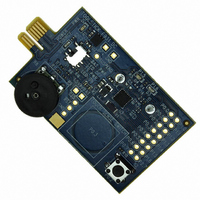TOOLSTICK931DC Silicon Laboratories Inc, TOOLSTICK931DC Datasheet - Page 5

TOOLSTICK931DC
Manufacturer Part Number
TOOLSTICK931DC
Description
DAUGHTER CARD TOOLSTCK C8051F931
Manufacturer
Silicon Laboratories Inc
Series
ToolStickr
Type
MCUr
Datasheet
1.TOOLSTICK931DC.pdf
(20 pages)
Specifications of TOOLSTICK931DC
Contents
Board
Accessory Type
Tool Stick Daughter Card
Peak Reflow Compatible (260 C)
No
Kit Contents
ToolStick C8051F931 Daughter Card, A76 Battery
Processor To Be Evaluated
C8051F931
Interface Type
USB
Operating Supply Voltage
2.7 V to 3.6 V
Development Tool Type
Hardware / Software - Dev Kit (Dev Tool)
Rohs Compliant
No
For Use With
336-1345 - TOOLSTICK BASE ADAPTER336-1182 - ADAPTER USB DEBUG FOR C8051FXXX
Lead Free Status / RoHS Status
Lead free / RoHS Compliant
For Use With/related Products
C8051F931
Lead Free Status / Rohs Status
Lead free / RoHS Compliant
Other names
336-1474
ToolStick-F931DC
5.4. Keil µVision2 and µVision3 Silicon Laboratories Drivers
As an alternative to the Silicon Laboratories IDE, the uVision debug driver allows the Keil µVision2 and µVision3
IDEs to communicate with Silicon Laboratories on-chip debug logic. In-system Flash memory programming
integrated into the driver allows for rapidly updating target code. The µVision2 and µVision3 IDEs can be used to
start and stop program execution, set breakpoints, check variables, inspect and modify memory contents, and
single-step through programs running on the actual target hardware.
For more information, please refer to the µVision driver documentation. The documentation and software are
available from the Downloads webpage (www.silabs.com/mcudownloads).
5.5. ToolStick Terminal
The ToolStick Terminal program provides the standard terminal interface to the target microcontroller's UART.
However, instead of requiring the usual RS-232 and COM port connection, ToolStick Terminal uses the USB
interface of the ToolStick Base Adapter to provide the same functionality.
In addition to the standard terminal functions (send file, receive file, change baud rate), two GPIO pins on the target
microcontroller can be controlled using the Terminal for either RTS/CTS handshaking or software-configurable
purposes (see the demo software for an example).
See Section "7.8. Using ToolStick Terminal‚" on page 16 for more information. The software is available on the
ToolStick webpage (www.silabs.com/toolstick).
Rev. 0.1
5

























